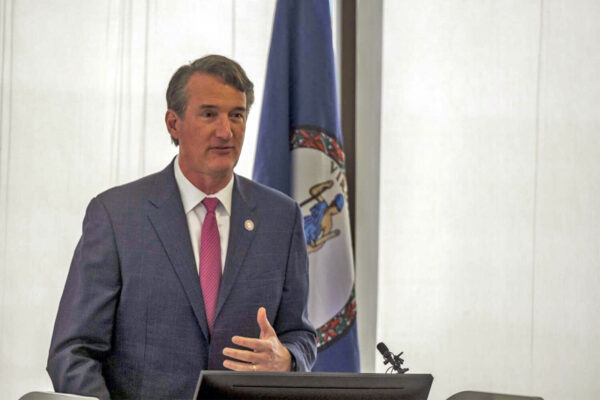
Virginia Gov. Glenn Youngkin vetoed 25 bills this week, of which nearly half were proposed or championed by Arlington lawmakers.
The new governor signed 700 bills sent to his desk during the 2022 General Assembly session, including some from Arlington lawmakers addressing mental health treatment, medical debt and virtual meetings.
Of those he vetoed, nine were proposed by Sen. Adam Ebbin (D-30), who represents part of the county, and four were filed by Arlington’s Del. Patrick Hope (D-47).
Some lawmakers and observers in state politics have interpreted the rebuffs of Ebbin’s bills as political tit-for-tat. Ebbin was at the center of some Youngkin appointments that were blocked earlier this year and Youngkin signed identical House bills in a half-dozen of those cases, the Washington Post reports.
In a statement, Ebbin said he is “stunned” by Youngkin’s decision to veto “meaningful, non-controversial” legislation.
“It is the polar opposite of what he campaigned on,” he said in an email to supporters and on Twitter. “These vetoes, from protecting living organ donors to enhancing consumers’ data privacy to reforming the [Virginia Employment Commission], are not in the best interest of Virginians.”
Gov. Youngkin vetoed 9/10 bills that reached his desk from Sen. Adam Ebbin (D-Alexandria).
As @patrickmwilson reported, Youngkin's aide warned of this outcome in February after Dems blocked some Youngkin appointments: https://t.co/HNKTQfna0R
— Ben Paviour (@BPaves) April 12, 2022
As for Hope’s vetoed bills, one that caused a splash was HB 669, which would have initiated a study to see if the Virginia Department of Health should regulate swimming pools and water recreational facilities.
Advocates of the legislation say unregulated pools can pose health risks and the bipartisan-supported legislation would have added safeguards for swimmers and coaches.
A thread: Governor Glenn Youngkin vetoed HB 669 @HopeforVirginia's bill that would have directed the Commissioner of Health to create a group study to determine whether pools should be regulated by VDOH. As a swimmer, I have some serious concerns.
— Langston Carter (@LangstonACarter) April 12, 2022
This isn't government overreach. It's something the government should have been doing a long time ago. When a pool isn't properly maintained, it's dangerous to the public.
Thank you @HopeforVirginia for working to fix this.
— Langston Carter (@LangstonACarter) April 12, 2022
Youngkin said the goal is “commendable” but directed lawmakers to consolidate this proposed work with existing efforts, rather than create “duplicative work.”
Another that went up in smoke was HB 675, and its Senate equivalent, which would have eliminated health insurance premiums for tobacco users. He said these higher rates incentivize healthier habits and the legislation would require non-users to foot the bill for increased healthcare costs.
Hope rebutted that it would have expanded coverage and decreased premiums.
HB 675 would have DECREASED premiums by 4.5% and REDUCED the number of uninsured by 14,000. @GovernorVA vetoed the bill. Virginians can’t afford to pay higher health care costs. https://t.co/As81uIkTDX
— Patrick Hope (@HopeforVirginia) April 12, 2022
These vetoes come after Youngkin vetoed Hope’s bill earlier this year that would have allowed the Arlington County Board to hire an independent auditor for the Community Oversight Board, which reviews complaints of alleged police misconduct.
That duty remains with County Manager Mark Schwartz. Locally, it was viewed as a procedural bill giving the Board a similar level of authority enjoyed by other local governing bodies.
Another bill with Arlington ties, HB 802, would have allowed a local governing body to force landlords to address decaying conditions at their properties if they constituted a serious threat to life, health or safety of tenants.
Elizabeth Bennett-Parker (D-45), who represents parts of Arlington, was a chief co-patron. The text was developed with the Arlington branch of the NAACP in the wake of the discovery of mold, rodents and other health concerns at the Serrano Apartments on Columbia Pike, says NAACP Housing Chair Kellen MacBeth.
He said he was “deeply disappointed” by the veto, calling it “a troubling sign of what the next four years will be like for low-income tenant rights at the state level.”
Still, Youngkin approved or amended a number of bills from Arlington lawmakers tackling their legislative priorities.
One such bill, which Hope filed, would make mandatory outpatient treatment — or court-ordered treatment outside of a state facility — “a more viable alternative” to involuntary treatment. With involuntary treatment, patients are required to be hospitalized in a state facility until a hearing can be scheduled to determine what treatment they need.
But with a shortage of beds in state facilities, involuntary treatment is straining the system. Locally, this has caused burnout among Arlington police officers and social workers and prompted local lawmakers to make this a focus for the 2022 session.
Hope says the bill is all but approved, as he intends to accept Youngkin’s recommendation to change the month it goes into effect from July to October.
“Once fully implemented across Virginia, [mandatory outpatient treatment] will be a less restrictive treatment option and take badly needed pressure off state and private hospitals, helping ease our shortage of psychiatric beds,” he said.
A new law from Sen. Barbara Favola (D-31) will expand who is allowed to transport someone in need of involuntary treatment to a state facility. Currently, this falls to police officers, and the legislation makes it possible to further uncouple police from mental health responses.
Youngkin also signed her bill requiring hospitals to screen uninsured patients to determine if they are eligible for financial assistance and prohibiting hospitals from “engaging in extraordinary collection actions” to recover medical debt.
Meanwhile, after two years of pandemic-prompted advocacy by Bennett-Parker, Arlington County Board member Libby Garvey and other local lawmakers, certain public bodies will now be able to meet virtually — provided the public has electronic access to the meeting — outside of a state of emergency.
Local governing bodies, school boards, planning commissions, architectural review boards and zoning appeals boards will still have to meet in person.

